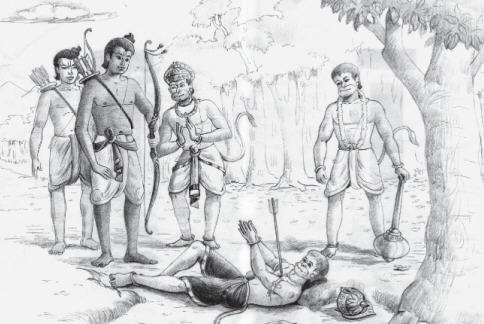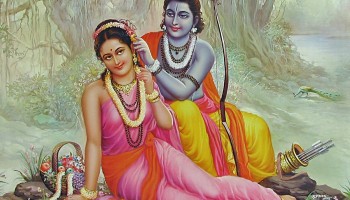‘Why Rama killed Vali?’ Valmiki Ramayana Answers…
– Prof. Shashi Tiwari, General Secretary, WAVES-India
Vālmīki-Rāmāyaṇa is a regarded as a Dharmaś́āstra which exemplifies the Vedic Values. Vālmīki lays great emphasis on Dharma or righteousness, the principle that upholds society and country. To serve mankind is the greatest virtue for a king or administrator, according to Rāmāyaṇa. Rāma is called Puruṣaṛṣ̣abha (best human being) whose inspiration was truthful moral life. ‘Sarva-bhūta-hite rataḥ’ (always busy in the welfare of all) was his social ideal. The Rāmāyaṇa consists of 24,000 verses in seven books (kāṇḍas). The fourth book, Kiṣkindhā Kāṇḍa, describes the meeting of Hanum̄an with Rāma, the destruction of the vānara king Vālī and the coronation of his younger brother Sugrīva to the throne of the kingdom of Kiṣkindhā.
Rāma was an exiled prince but was still behaving as a king because Bharata had not accepted kingship officially and moreover he was not sitting on the royal throne (Raja-siṁhāsana) of Ayodhyā. Rāma was performing all political duties related to the welfare and protection of his subjects while he was in kingdom or in forest during exile. At the time, when Sri Rāma was preparing himself for Vanavāsa, he left all decorative ornaments and dresses to be dressed in Munivastra Valkala. Without fail he kept his Dhanuṣa, and tarakasa for the protection of state and its people, living in the city or forest. After accepting the appeal of Lakṣmaṇa to accompany him in the exile, Rāma ordered him immediately to bring his divine weapons, preserved by Guru Vasiṣṭha.
One question is often raised – why did Rāma choose the weaker of the two brothers as his ally? Kabandha advised Rāma to seek the friendship of Sugrīva, who knew the geography and the topography of the world and who was in trouble like Rāma. Sugrīva will be a proper ally because he needed Rāma’s help and Rāma needed his help. Between the two placed in similar situations there will be a subtle bond of friendship. Further, Shri Rāma offered friendship to Sugrīva, and not to king Vālī, because he found him careless as a king who could not notice the evil act of Rāvaṇa taking away Sītā all the way through sky, while Sugrīva and Hanumān observed that carefully.
Later Rāma killed Vālī from behind a tree, and that too when Vālī was engaged in battle with other man. Vālī called this action of Rāma as immoral deed which is not supported by dharma (Ram. IV.17.52). Śri Rāma replied and consoled Vālī with words that contain the essence of righteousness ‘dharma’. He scolded him, ‘you don’t know the true meaning of Dharma. You know no law, no restraint’. It is important to see how Rāma tried to refute the allegations brought against him by Vālī.

The first argument against Vālī’s accusation is: ‘this earth, with its mountains, woods, and forests are under the sway of Ikṣavākus. They take it upon themselves to protect or punish the beasts, birds and men within their empire. Truthful and righteous Bharata sits on their throne at present. He is the soul of truth and honor. He himself has assumed the charge of protecting this land. He puts forth his strength and valour against his foes even as the shatras would have it. He always acts in the right time and place. We and some other kings rule under him according to kingly tradition and roam the earth to bring law and order among his subjects. Who would dare to defy dharma when that noble king rules the earth? We shall consider how we shall punish them who go astray’ (Ram.IV.18.6).
It means in exile also Rāma was with delegation of royal powers. On the basis of Tilaka’s commentary we may say that though Bharata did not give such authority to Rāma at Citrakūṭa, implication may be drawn here about such authority. When Bharata was king his power spread to his relations and naturally Rāma had a share of it. After the debate it was arranged that Rāma should in law be king and that Bharata should be his regent. The person who delegated the authority certainly could act for him or resume back the authority. Vālī may be an independent king of Kiṣkindhā, but what Rāma enunciated, was the law in Āryāvarta.
Ram’s second justification to Vālī was on moral grounds. Vālī has ravished the spouse of his younger brother called Rumā, and it is Kṣatriya dharma to punish all those who violate moral rules and commit sins. Rāma said, ‘You blinded with lust has done this crime which could not be ignored. I know of no other punishment than this for you.’
The third argument was that he has made a promise to friend Sugrīva to protect him. Rama explained, ‘Sugrīva is dear friend to me even as Lakṣmaṇa, and in consequence, he should be restored to his crown and wife. He even seeks my welfare. Further, you are the foe of Sugrīva that has won my friendship, then according to the rules of kingly polity, you are my enemy too. To help a friend in distress is also considered dharma. So view it from any point; I have given you this punishment according to dharma. We, kings, have to act according to Shāstra. Moreover, if a person, after doing sinful act, accepts and enjoys punishment given by a king, then he becomes pure and goes to Swarga’ (Ram.18.29-32).
Further, on the objection ‘why he was killed from behind’ Rāma pointed out, ‘Kings used to do hunting of animals with all tactics. They don’t view it as a fault. Similarly, it is no crime to kill you whether you attack me or not.’ Hearing these words of R̄ama, V̄alī proclaimed with deep repentance, ‘Noble Sir! You speak about dharma and beyond the shadow of a doubt. I confess that I went back upon dharma and allied myself with vice and injustice. Please extend your forgiveness and protection unto me.’
Here we may see that Rāma explained that his action is not a crime at all. In this reference, another good reason of Rama’s action is well-known. Sītā was abducted by Rāvaṇa, a powerful king of South. This abduction was an insult which had to be avenged. To accomplish this purpose, Rāma needed powerful allies who could help him in this great task and therefore, he was constrained to enter into negotiations with those chiefs who were desirous of kingdom but were driven away, or who wished to join Rāma in the hope of securing a kingdom in return. Killing of Vālī was thus a means to get huge support of vānara army to fulfill objective of the welfare of the subjects.
Thus, Śri Rāma did the service of nation following the morals of Rājadharma for being a designated forthcoming king and a Kṣatriya during his exile. We know that he was not fighting for the expansion of his kingdom; and hence he crowned noble Sugrīva on the throne of Kiṣkindhā after killing Vālī. Till today Rama is regarded as the embodiment of Dharma and a famous quote says, ‘Rāmadivat pravartitavyam na rāvaṇādivat’ i.e., ‘one should act like Rāma and not like Rāvaṇa.’



No comments:
Post a Comment